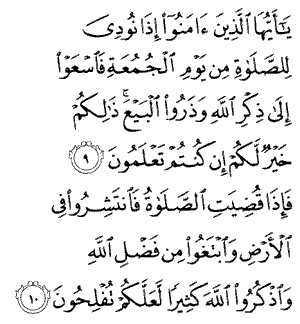True Implications, Grazing Animals, Bad Karma
Issue 858 » September 4, 2015 - Zul-Qadah 20, 1436
Living The Quran
True Implications
Al-Jumua (The Congregation) - Chapter 62: Verses 9-10
 "O you who believe, when you are called to prayer on the Friday (lit. the "day of congregation"), hurry to the remembrance of prayer and cease all business. That is better for you if you only knew. Then when the prayer is finished, disperse throughout the land and seek the bounty of God and remember God frequently so that you will prosper."
"O you who believe, when you are called to prayer on the Friday (lit. the "day of congregation"), hurry to the remembrance of prayer and cease all business. That is better for you if you only knew. Then when the prayer is finished, disperse throughout the land and seek the bounty of God and remember God frequently so that you will prosper."
In this passage, the verbs "hurry," "cease," "disperse," and "seek" are all in the imperative form. However, scholars understand only "hurry" and "cease" to create an obligation (farida), while "disperse" and "seek" imply permission (nadb), not obligation. That is, believers must make a sincere effort to get to the Friday prayer on time and must not engage in business after the call to prayer is made. On the other hand, believers are not required to leave the mosque and go to work when the prayer is finished. If they like they can go home for a nap, have lunch, stay in the mosque and study, etc.
The question arises, how do scholars distinguish which verbs imply obligation and which imply permission if all of them are expressed in the imperative form? Clearly, it is only by bringing some other factors to the text that it is possible to make such a distinction. The Sunna of the Prophet, the consensus of the scholars, and other considerations are brought in to the interpretive process to help understand the true implications of any Quranic verse. Given that so many variables are considered relevant to the analysis of any Quranic passage, it is not surprising that scholars will arrive at different conclusions.
Compiled From:
"The Story of The Quran: Its History and Place in Muslim Life" - Ingrid Mattson, pp. 189, 190
Understanding The Prophet's Life
Grazing Animals
Once the Prophet (peace be upon him) served a guest from Yemen a bowl of milk. When he finished drinking it, the Prophet asked him if he wanted more. The man said he would. This went on until the man drank seven bowls of milk, which was far more than what he needed. But when this man became a Muslim, the Companions noticed that he drank only one bowl of milk. The Prophet told them, "The disbeliever eats with seven intestines, while the believer eats with one." [Tirmidhi]
People eat much more now than ever in history, especially when it comes to meat. In the past, meat was eaten infrequently even by people of means, who ate meat once or twice a week. The poor ate meat once or twice in a year, mainly around times of Eid celebrations. Convenience stores and vending machines are all over the place. This abundance was unheard of not too long ago. All of this has virtually turned people into grazing animals, which is anathema to spiritual wellness.
There is now a callous relationship between human beings and their meals, an insensitivity to the flesh they eat and the source of their nutrition. The combination of overeating and a breakdown of meal manners impairs a person's ability to build fortitude. A Muslim begins each meal in the name of God. The purpose of this, in addition to sanctifying a mundane act, is to consciously remember the source of the provision.
Compiled From:
"Purification of the Heart" - Hamza Yusuf, pp. 146, 147
Blindspot!
Bad Karma
We often have a myopic view of the history of our own country or religious tradition and criticize others for behaviour of which "we" have been guilty in the past or even continue to be in the present. After the atrocities of September 11, 2001, I was often taken aback by the way some Christians berated the violence and intolerance they attributed to Islam, showing not only an embarrassing ignorance of Muslim history but a surprising blindness to the crusades, inquisitions, persecutions, and wars of religion that had scarred their own faith. I often felt that alongside programs titled "Understanding Islam" there should be a parallel course called "Understanding Christianity." There was also a worrying lack of awareness about Western behaviour during the colonial era, which had contributed to some of our current problems. A double standard, albeit unintended, violates our integrity and damages our credibility. In a global society, conflict is rarely the fault of only one party. All participants in a conflict have sown bad karma in the past, and we are all now reaping the results.
Compiled From:
"Twelve Steps to a Compassionate Life" - Karen Armstrong, pp. 157, 158